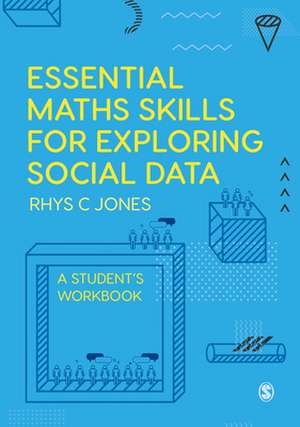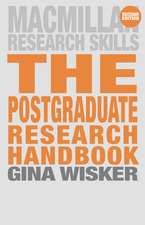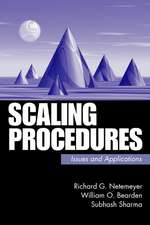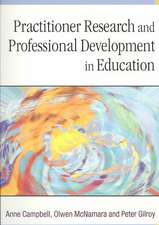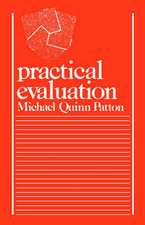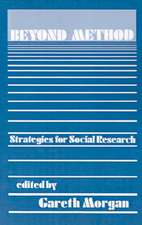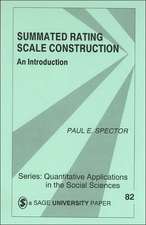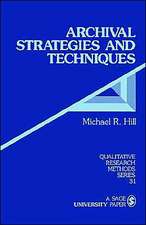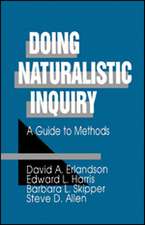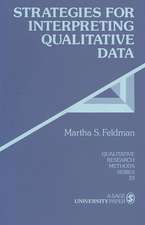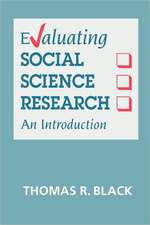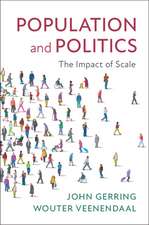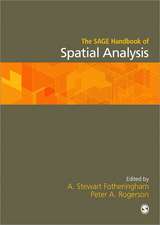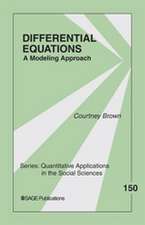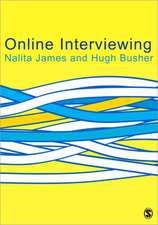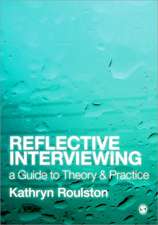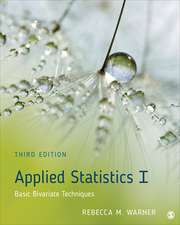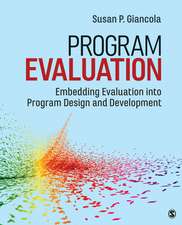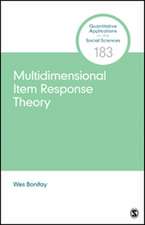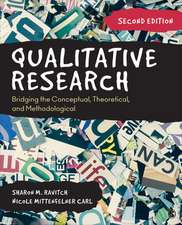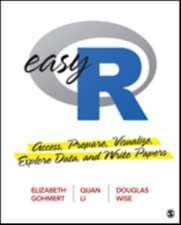Essential Maths Skills for Exploring Social Data: A Student's Workbook
Autor Rhys Christopher Jonesen Limba Engleză Paperback – 31 mar 2020
· Clear introductions to symbols and tasks
· Multiple choice questions and exercises
· Real world case studies and datasets
· A glossary of terms
To help you practice, this book is accompanied by useful online resources, including datasets and questions, as well as a selection of author videos.
| Toate formatele și edițiile | Preț | Express |
|---|---|---|
| Paperback (1) | 199.19 lei 3-5 săpt. | +12.02 lei 6-12 zile |
| SAGE Publications – 31 mar 2020 | 199.19 lei 3-5 săpt. | +12.02 lei 6-12 zile |
| Hardback (1) | 634.26 lei 6-8 săpt. | |
| SAGE Publications – 31 mar 2020 | 634.26 lei 6-8 săpt. |
Preț: 199.19 lei
Nou
Puncte Express: 299
Preț estimativ în valută:
38.11€ • 39.79$ • 31.54£
38.11€ • 39.79$ • 31.54£
Carte disponibilă
Livrare economică 14-28 martie
Livrare express 27 februarie-05 martie pentru 22.01 lei
Preluare comenzi: 021 569.72.76
Specificații
ISBN-13: 9781526463388
ISBN-10: 1526463385
Pagini: 186
Dimensiuni: 170 x 242 x 10 mm
Greutate: 0.31 kg
Ediția:1
Editura: SAGE Publications
Colecția Sage Publications Ltd
Locul publicării:London, United Kingdom
ISBN-10: 1526463385
Pagini: 186
Dimensiuni: 170 x 242 x 10 mm
Greutate: 0.31 kg
Ediția:1
Editura: SAGE Publications
Colecția Sage Publications Ltd
Locul publicării:London, United Kingdom
Recenzii
A friendly, accessible book to reawaken students’ latent maths knowledge. Written by a non-maths specialist, this book clearly shows students the importance of some of the core maths skills that they learnt in school and how those skills are at the heart of introductory data literacy. Using real world applied examples, this book will get them building confidence and competence with their numeracy skills, so often a barrier to students learning statistics and quantitative methods.
Having read through the book, in my opinion I think it is an excellent learning aid for introductory statistics. While some people may argue it is too simplistic to begin with, I disagree as students who come into university are not always straight out of school, some have never done statistics before or have not done it for several years and my simplifying it down to the bear basics, I feel the book provides a base to refresh the memory of students of which stats is a new concept.
For students of which the concept of statistics comes naturally or is not a new concept to, they may not need this book as the lectures/course notes may be sufficient to learn the content. However, with this book acting as a learning assistant, students who struggle with maths have the opportunity to buy the book to guide them through the course and assist with their learning.
?
I highly recommend this book, I think it has been well put together and would have loved to have the option of having this book during my stats course. Everyone learns differently, everyone has their strengths and weaknesses and in my opinion, in today's world there is no such thing as 'too simple'.
Rhys' book on data analysis and quantitative methods is made easy for statistics aspirants!
This book has made essential numeracy and quantitative skills so clear and easy to understand. In particular, the themes and data sets from different countries made my learning journey interesting. The case studies, exercises and visual aids provided in the book helped me improve my data analysis and interpretation skills, and sparked my interest in pursuing a statistics degree.
If you are a returning student to university or statistics aspirant, I will certainly recommend this book to enrich your numeracy and data analysis skills.
Some excellent and sustained work by Rhys Jones and colleagues at Cardiff underpins this book. The ideas, principles and approaches have all been tested under fire and adapted and modified to offer really effective tool to support those wishing to revisit their data skills before they move on to university or embark on the increasing number of degrees where avoiding data use is unavoidable. The book itself is really accessible and clear, building up gradually and carefully (where the experience of having taught this in the real world truly counts!
Having read through the book, in my opinion I think it is an excellent learning aid for introductory statistics. While some people may argue it is too simplistic to begin with, I disagree as students who come into university are not always straight out of school, some have never done statistics before or have not done it for several years and my simplifying it down to the bear basics, I feel the book provides a base to refresh the memory of students of which stats is a new concept.
For students of which the concept of statistics comes naturally or is not a new concept to, they may not need this book as the lectures/course notes may be sufficient to learn the content. However, with this book acting as a learning assistant, students who struggle with maths have the opportunity to buy the book to guide them through the course and assist with their learning.
?
I highly recommend this book, I think it has been well put together and would have loved to have the option of having this book during my stats course. Everyone learns differently, everyone has their strengths and weaknesses and in my opinion, in today's world there is no such thing as 'too simple'.
Rhys' book on data analysis and quantitative methods is made easy for statistics aspirants!
This book has made essential numeracy and quantitative skills so clear and easy to understand. In particular, the themes and data sets from different countries made my learning journey interesting. The case studies, exercises and visual aids provided in the book helped me improve my data analysis and interpretation skills, and sparked my interest in pursuing a statistics degree.
If you are a returning student to university or statistics aspirant, I will certainly recommend this book to enrich your numeracy and data analysis skills.
Some excellent and sustained work by Rhys Jones and colleagues at Cardiff underpins this book. The ideas, principles and approaches have all been tested under fire and adapted and modified to offer really effective tool to support those wishing to revisit their data skills before they move on to university or embark on the increasing number of degrees where avoiding data use is unavoidable. The book itself is really accessible and clear, building up gradually and carefully (where the experience of having taught this in the real world truly counts!
Cuprins
Introduction
Essential Numeracy
Percentages and Decimal Points
Ratio and Proportions
Tables
Introduction to Statistics
Graphs
Exploring Data and Descriptive Statistics
Observational Studies and Experiments
Polls and Surveys
How will I use Statistics?
Essential Numeracy
Percentages and Decimal Points
Ratio and Proportions
Tables
Introduction to Statistics
Graphs
Exploring Data and Descriptive Statistics
Observational Studies and Experiments
Polls and Surveys
How will I use Statistics?
Notă biografică
Rhys is an internationally recognised educational leader with extensive experience in curriculum development and curriculum theory, statistics education and engaging students in small and large classroom settings (offline and online). He also has extensive experience of using digital literacy skills and learning analytics to enhance the student experience, using digital platforms to assess student engagement and interaction. Rhys also is a member of the Royal Statistical Societies teaching section as well as the Education Policy Advisory Group. Both committees work on a National and international level to improve the teaching of statistics and data science in schools, universities and relevant industry sectors.
Rhys formerly worked as a Professor of Statistical Literacy and Associate Dean of Education at the Faculty of Health and Medical Sciences, at the University of Surrey. Prior to this, he was based in the Department of Statistics at the University of Auckland, which is a world leading department in the areas of statistics and statistics education. He has a broad academic background in the areas of biology, chemistry, statistics, and education, and has held lecturing positions at the University of Auckland, Cardiff University, London Southeast College, and Birmingham City University. Over his career he has taught a variety of subjects, at both undergraduate and postgraduate level, which include statistics, quantitative methods, mathematics for science, teacher training, research methods, biomedical science, nutrition and organic chemistry, health and well-being, and clinical anatomy and physiology. He has also taught a variety of science-based subjects in FE colleges, which include GCSE, BTEC, Access and A levels. His primary research contributions are in the areas of curriculum development, randomness misconceptions, and the role of context in statistics education. Rhys¿s research interests also focus on mathematical and statistical anxiety, helping to inform strategies to engage and motivate people in these subjects.
Rhys has developed extensive experience in using active learning approaches in the teaching of statistics, to thousands of students over his career. In using these approaches, he has thoroughly enjoyed the challenge of bringing to life the teaching of statistics, across a range of disciplines and education levels (in schools and at university) across the planet. These teaching and learning activities have been incorporated throughout this book, to help engage and excite people in the art of statistical literacy, and the creation of compelling data stories.
Rhys formerly worked as a Professor of Statistical Literacy and Associate Dean of Education at the Faculty of Health and Medical Sciences, at the University of Surrey. Prior to this, he was based in the Department of Statistics at the University of Auckland, which is a world leading department in the areas of statistics and statistics education. He has a broad academic background in the areas of biology, chemistry, statistics, and education, and has held lecturing positions at the University of Auckland, Cardiff University, London Southeast College, and Birmingham City University. Over his career he has taught a variety of subjects, at both undergraduate and postgraduate level, which include statistics, quantitative methods, mathematics for science, teacher training, research methods, biomedical science, nutrition and organic chemistry, health and well-being, and clinical anatomy and physiology. He has also taught a variety of science-based subjects in FE colleges, which include GCSE, BTEC, Access and A levels. His primary research contributions are in the areas of curriculum development, randomness misconceptions, and the role of context in statistics education. Rhys¿s research interests also focus on mathematical and statistical anxiety, helping to inform strategies to engage and motivate people in these subjects.
Rhys has developed extensive experience in using active learning approaches in the teaching of statistics, to thousands of students over his career. In using these approaches, he has thoroughly enjoyed the challenge of bringing to life the teaching of statistics, across a range of disciplines and education levels (in schools and at university) across the planet. These teaching and learning activities have been incorporated throughout this book, to help engage and excite people in the art of statistical literacy, and the creation of compelling data stories.
Descriere
Pre-empt any student anxiety about their maths skills ahead of their forthcoming statistics module with this hands-on workbook. Packed with clear explanations, real-world examples and practical exercises it gives them all the necessary maths skills to tackle statistics with confidence.
